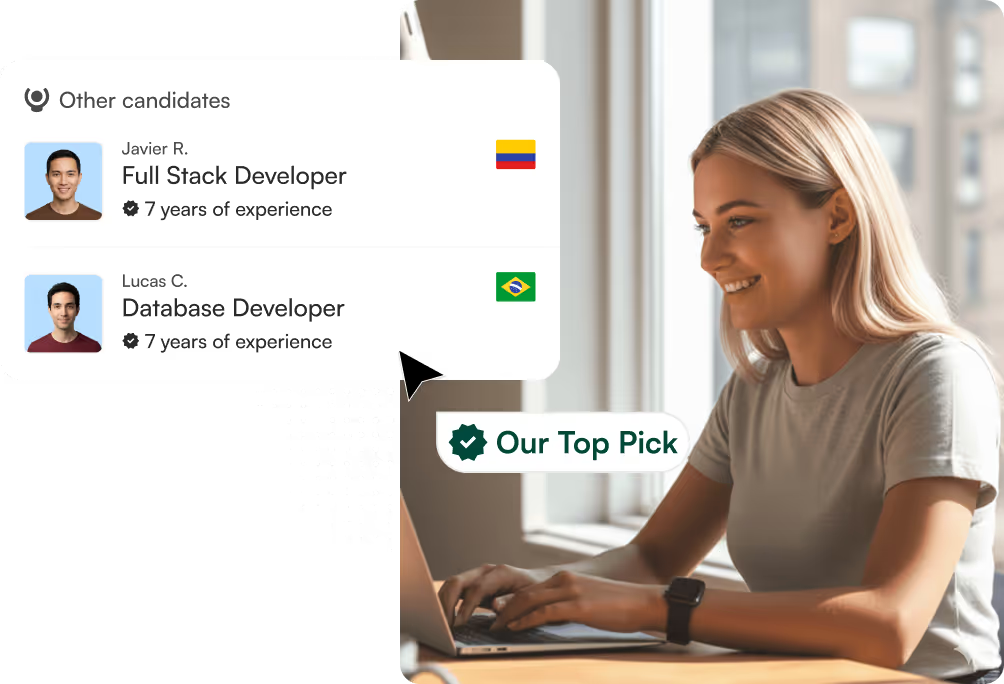50+ Essential Interview Questions to Ask Candidates in 2026


Lupa will help you hire top talent in Latin America.
Book a Free Consultation
Lupa helps you build, manage, and pay your remote team. We deliver pre-vetted candidates within a week!
Book a Free ConsultationIn today's competitive job market, asking the right interview questions to ask candidates is crucial for making successful hires. Strategic interview questions help evaluate candidates beyond their resumes, revealing insights about their skills, experience, personality, and cultural fit. Whether you're a hiring manager, recruiter, HR professional, or business owner, having a well-structured approach to interviewing can significantly improve your hiring outcomes.
This comprehensive guide provides over 50 essential interview questions to ask candidates, categorized by purpose, along with best practices for conducting effective interviews. By using these questions, you'll be able to make more informed decisions and find candidates who will thrive in your organization.
Behavioral Interview Questions
Behavioral interview questions are based on the premise that past behavior predicts future performance. According to research, 75% of recruiters feel behavioral questions help determine candidate performance more accurately than other question types. These questions ask candidates to provide specific examples from their past experiences.
When evaluating responses to behavioral interview questions, consider using the STAR technique (Situation, Task, Action, Result) to assess how thoroughly and effectively candidates describe their experiences.
1. Tell me about a time when you faced a significant challenge at work. How did you overcome it?
This question helps assess problem-solving abilities and resilience. Look for candidates who can clearly articulate the challenge, their approach to solving it, and the specific actions they took. Strong candidates will provide concrete examples with measurable outcomes and demonstrate resourcefulness, determination, and a positive attitude toward challenges.
2. Describe a situation where you received constructive criticism. How did you respond?
This question evaluates a candidate's ability to accept feedback and grow from it. Look for self-awareness, humility, and a growth mindset in their response. Candidates who can acknowledge areas for improvement and explain how they implemented feedback demonstrate maturity and a commitment to professional development. Be wary of candidates who become defensive or can't recall receiving criticism.
3. Tell me about a time when you had to resolve a conflict with a colleague or client.
This question assesses interpersonal skills and conflict resolution abilities. Strong candidates will demonstrate emotional intelligence by explaining how they navigated a disagreement professionally. Look for communication skills, empathy, and the ability to find win-win solutions. The best responses will show that the candidate can maintain professional relationships even during challenging situations.
4. Describe a situation where you had to make an important decision with limited information.
This question evaluates decision-making abilities under pressure. Look for analytical thinking, risk assessment, and confidence in making tough calls. Strong candidates will explain their thought process, how they gathered what information was available, and how they balanced speed with accuracy. Their response should demonstrate sound judgment and the ability to take responsibility for decisions.
5. Tell me about a time when you had to handle multiple priorities with tight deadlines.
This question assesses time management and prioritization skills. Look for organizational abilities, stress management, and efficiency in the candidate's response. Strong candidates will explain their approach to prioritizing tasks, how they communicated with stakeholders, and how they successfully delivered results despite competing demands. Their answer should reveal how they maintain quality while managing pressure.
Situational Interview Questions
Situational interview questions differ from behavioral questions by focusing on hypothetical scenarios rather than past experiences. These questions help assess how candidates might handle future situations in the role. Approximately 80% of professionals encounter high-pressure scenarios in their careers, making these questions particularly relevant for evaluating potential performance.
6. How would you handle a situation where a team member isn't contributing their fair share?
This question evaluates leadership skills and team management abilities. Look for a balanced approach that shows both accountability and empathy. Strong candidates will explain how they would first seek to understand the underlying issues, communicate expectations clearly, and work collaboratively to find solutions. Their response should demonstrate a commitment to team success while supporting individual team members.
7. What would you do if you were assigned a project but lacked some of the necessary skills?
This question assesses learning agility and resourcefulness. Look for candidates who demonstrate a growth mindset and initiative in seeking resources. Strong responses will include strategies for skill acquisition, such as seeking mentorship, utilizing online learning resources, or collaborating with colleagues who have complementary skills. The best candidates will view skill gaps as growth opportunities rather than obstacles.
8. How would you approach a situation where you disagree with your manager's decision?
This question evaluates communication skills and professional maturity. Look for respectful communication, constructive feedback, and understanding of organizational hierarchy. Strong candidates will explain how they would express their concerns privately, provide data or reasoning to support their perspective, and ultimately support the final decision once it's made. Their response should demonstrate both conviction and flexibility.
9. If you noticed a process that could be improved, how would you go about implementing change?
This question assesses initiative and change management skills. Look for analytical thinking, stakeholder management, and implementation planning in the response. Strong candidates will describe how they would gather data to support the need for change, involve key stakeholders in the process, and create a clear implementation plan. Their answer should demonstrate both innovation and practicality.
10. How would you handle a difficult client or customer who has unreasonable demands?
This question evaluates customer service skills and emotional intelligence. Look for patience, problem-solving abilities, and the ability to maintain professional relationships even in challenging situations. Strong candidates will explain how they would listen actively, acknowledge concerns, set appropriate boundaries, and work toward realistic solutions. Their response should demonstrate both empathy and assertiveness.
Career-Based Interview Questions
Career-based questions help assess a candidate's motivations, aspirations, and long-term fit with the organization. These questions reveal whether the candidate's career goals align with what the position and company can offer, which is crucial for retention and engagement.
11. Why are you interested in this role and our company?
This question evaluates a candidate's research, motivation, and alignment with the company's mission. Look for specific knowledge about the company and genuine enthusiasm in their response. Strong candidates will have done their homework, referencing specific aspects of the company culture, products, services, or mission that resonate with them. Their answer should demonstrate that they've thought carefully about how they would fit into the organization.
12. Where do you see yourself professionally in five years?
This question assesses career planning and ambition. Look for realistic goals that align with the company's growth trajectory and demonstrate commitment. Strong candidates will have thoughtful, well-articulated career plans that show they've considered how the current role fits into their longer-term objectives. Their response should indicate that they're looking to grow with the organization rather than using it as a stepping stone.
13. What aspects of your current or previous job do you enjoy the most?
This question helps determine if the candidate will find satisfaction in the role. Look for alignment between what they enjoy and what the position offers. Their response reveals motivational drivers and can help you understand if the day-to-day responsibilities of the role will be engaging for them. Strong candidates will connect their preferences to specific aspects of the open position.
14. What are you looking for in your next role that your current position doesn't offer?
This question evaluates a candidate's priorities and potential fit. Look for growth opportunities, new challenges, or better alignment with skills in their response. Strong candidates will focus on positive aspects rather than complaints about their current employer. Their answer should demonstrate ambition and a desire for professional development while remaining respectful of their current or previous organization.
15. How do you stay current with industry trends and developments?
This question assesses a candidate's commitment to professional development. Look for specific learning methods, professional organizations, or continuing education in their response. Strong candidates will demonstrate curiosity and initiative by describing multiple approaches to staying informed, such as industry publications, conferences, online courses, or professional networks. Their answer should show a proactive approach to learning.
Skill Assessment Questions
Skill assessment questions help evaluate a candidate's technical abilities and expertise relevant to the role. These questions should be tailored to the specific position and required competencies to ensure you're evaluating the skills that matter most for success in the role.
16. What specific skills or expertise would you bring to this position?
This question helps identify a candidate's strengths and how they align with job requirements. Look for relevant technical skills, soft skills, and examples of applying these skills in previous roles. Strong candidates will demonstrate self-awareness by clearly articulating their core competencies and providing specific examples of how these skills have created value in past positions. Their response should directly connect to the requirements in the job description.
17. Describe a project where you successfully applied your technical skills.
This question evaluates practical application of skills. Look for clear examples, measurable outcomes, and problem-solving abilities in the response. Strong candidates will provide specific, quantifiable results and explain their role in achieving those outcomes. Their answer should demonstrate both technical proficiency and the ability to apply those skills to create business value.
18. How do you approach learning new technologies or methodologies?
This question assesses learning agility and adaptability. Look for learning strategies, openness to new ideas, and examples of quick skill acquisition. Strong candidates will describe their approach to mastering new skills, including how they prioritize learning, apply new knowledge, and overcome challenges in the learning process. Their response should demonstrate a growth mindset and enthusiasm for continuous improvement.
19. What tools or software are you proficient in that relate to this role?
This question evaluates technical proficiency. Look for depth of knowledge, practical experience, and awareness of industry-standard tools. Strong candidates will be honest about their proficiency levels, distinguishing between tools they've mastered and those they have basic familiarity with. Their answer should demonstrate both current capabilities and willingness to learn new tools as needed.
20. How do you ensure the quality of your work?
This question assesses attention to detail and quality standards. Look for quality control processes, self-review practices, and commitment to excellence. Strong candidates will describe specific strategies they use to maintain high standards, such as checklists, peer reviews, or testing methodologies. Their response should demonstrate conscientiousness and a proactive approach to quality assurance.
Cultural Fit Questions
Cultural fit questions help determine if a candidate's values, work style, and personality align with the company culture. According to research, cultural fit is a significant factor in employee satisfaction and retention, with misalignment often leading to early departures. These cultural fit questions help assess compatibility with your organization's environment.
21. Describe your ideal work environment.
This question helps assess alignment with the company's work environment. Look for preferences for collaboration, autonomy, structure, or flexibility that match what your organization offers. Strong candidates will articulate specific elements of a work environment that enable their best performance, such as team dynamics, physical space, or management approach. Their response should give you insight into whether they would thrive in your company's setting.
22. How would your colleagues describe your work style?
This question evaluates self-awareness and interpersonal dynamics. Look for communication style, teamwork approach, and professional reputation in the response. Strong candidates will provide balanced, thoughtful assessments that include both strengths and areas for growth. Their answer should demonstrate reflection on how they interact with others and contribute to team dynamics.
23. What type of management style do you respond to best?
This question helps determine if the candidate will thrive under the company's leadership approach. Look for preferences for guidance, feedback, and autonomy that align with your managers' styles. Strong candidates will articulate their needs while demonstrating adaptability to different leadership approaches. Their response should help you understand how to set them up for success if hired.
24. Tell me about a company culture you've thrived in and why it worked for you.
This question assesses cultural preferences and past experiences. Look for values alignment, work environment preferences, and engagement drivers in the response. Strong candidates will describe specific elements of culture that enabled their success, such as innovation, collaboration, or customer focus. Their answer should help you evaluate whether your organization offers a similar environment.
25. How do you contribute to a positive team atmosphere?
This question evaluates teamwork and emotional intelligence. Look for collaboration skills, conflict resolution abilities, and a positive attitude in the response. Strong candidates will provide specific examples of how they support colleagues, foster communication, and contribute to team morale. Their answer should demonstrate awareness of team dynamics and a proactive approach to creating a positive work environment.
Problem-Solving Questions
Problem-solving questions help assess a candidate's analytical thinking, creativity, and approach to challenges. These questions reveal how candidates think through complex situations, which is valuable for virtually any role. When evaluating responses to problem-solving questions, look for structured thinking and innovative approaches.
26. Describe a complex problem you solved at work. What was your approach?
This question evaluates analytical abilities and methodical thinking. Look for problem identification, solution development, and implementation in the response. Strong candidates will walk through their problem-solving process step by step, explaining how they defined the problem, gathered information, developed options, and implemented a solution. Their answer should demonstrate structured thinking and attention to detail.
27. How do you approach problems that don't have clear solutions?
This question assesses comfort with ambiguity and creative thinking. Look for research methods, consultation with others, and innovative approaches in the response. Strong candidates will explain how they navigate uncertainty, gather diverse perspectives, and test potential solutions. Their answer should demonstrate flexibility and resourcefulness when facing ill-defined challenges.
28. Tell me about a time when you had to think outside the box to solve a problem.
This question evaluates creativity and innovation. Look for unconventional thinking, resourcefulness, and willingness to take calculated risks in the response. Strong candidates will describe a situation where standard approaches were insufficient and explain how they developed a novel solution. Their answer should demonstrate original thinking and the courage to try new approaches.
29. How do you make decisions when you have multiple good options?
This question assesses decision-making processes and prioritization. Look for evaluation criteria, risk assessment, and alignment with objectives in the response. Strong candidates will explain their framework for comparing options, such as cost-benefit analysis, alignment with goals, or impact assessment. Their answer should demonstrate thoughtful analysis and clear reasoning.
30. Describe a situation where you had to solve a problem with limited resources.
This question evaluates resourcefulness and efficiency. Look for creativity, prioritization, and maximizing available resources in the response. Strong candidates will explain how they identified the most critical needs, leveraged existing assets, and found innovative ways to accomplish goals despite constraints. Their answer should demonstrate adaptability under constraints and the ability to do more with less.
Leadership and Teamwork Questions
Leadership and teamwork questions help assess a candidate's ability to collaborate, influence others, and take initiative. These qualities are important regardless of whether the role has direct management responsibilities, as they contribute to organizational effectiveness at all levels.
31. Tell me about a time when you led a team through a challenging situation.
This question evaluates leadership abilities and crisis management. Look for direction-setting, team motivation, and outcome achievement in the response. Strong candidates will describe how they provided clarity, supported team members, and maintained focus on objectives despite obstacles. Their answer should demonstrate both empathy and decisiveness in guiding others through difficulty.
32. How do you motivate team members who are struggling with their tasks?
This question assesses leadership style and emotional intelligence. Look for coaching approach, empathy, and performance management in the response. Strong candidates will explain how they identify underlying issues, provide appropriate support, and help team members develop their capabilities. Their answer should balance support with accountability to drive results.
33. Describe a situation where you had to collaborate with a difficult team member.
This question evaluates interpersonal skills and conflict management. Look for patience, communication strategies, and focus on shared goals in the response. Strong candidates will explain how they found common ground, adapted their approach, and maintained professionalism despite challenges. Their answer should demonstrate the ability to work effectively with diverse personalities.
34. How do you ensure effective communication within a team?
This question assesses communication skills and team coordination. Look for communication methods, feedback loops, and clarity of messaging in the response. Strong candidates will describe specific strategies they use to promote understanding, such as regular check-ins, clear documentation, or tailoring communication to different preferences. Their answer should demonstrate awareness of communication challenges and proactive solutions.
35. Tell me about a time when you had to step up and take initiative without being asked.
This question evaluates proactivity and ownership. Look for opportunity identification, action-taking, and results achieved in the response. Strong candidates will describe how they recognized a need, developed a plan, and implemented a solution without waiting for direction. Their answer should demonstrate self-motivation and leadership potential regardless of formal authority.
Questions About Adaptability and Growth
Questions about adaptability and growth help assess a candidate's ability to learn, change, and develop professionally. These qualities are increasingly important in rapidly evolving workplaces where flexibility and continuous learning are essential for long-term success.
36. Tell me about a time when you had to adapt to a significant change at work.
This question evaluates flexibility and resilience. Look for attitude toward change, adjustment strategies, and positive outcomes in the response. Strong candidates will describe how they navigated a major transition, such as reorganization, new leadership, or process changes. Their answer should demonstrate openness to change and the ability to maintain effectiveness during transitions.
37. Describe a situation where you had to learn a new skill quickly.
This question assesses learning agility and self-development. Look for learning methods, application of new skills, and results achieved in the response. Strong candidates will explain their approach to rapid skill acquisition, including how they prioritized learning objectives, found resources, and applied new knowledge. Their answer should demonstrate enthusiasm for learning and the ability to step outside their comfort zone.
38. How do you handle feedback and criticism?
This question evaluates self-awareness and growth mindset. Look for openness to feedback, implementation of suggestions, and continuous improvement in the response. Strong candidates will explain how they actively seek input, process constructive criticism, and use it to enhance their performance. Their answer should demonstrate humility and a genuine desire to grow.
39. Tell me about a professional failure and what you learned from it.
This question assesses resilience and self-reflection. Look for accountability, lessons learned, and subsequent improvements in the response. Strong candidates will openly discuss a mistake or setback, take responsibility for their part, and explain how the experience shaped their approach going forward. Their answer should demonstrate honesty without being defensive and show how they turn failures into learning opportunities.
40. How do you stay motivated when working on routine or repetitive tasks?
This question evaluates self-motivation and work ethic. Look for finding meaning in work, setting personal challenges, and maintaining quality standards in the response. Strong candidates will explain their strategies for staying engaged with necessary but mundane tasks, such as focusing on the larger purpose, creating efficiency goals, or breaking work into manageable segments. Their answer should demonstrate consistency and professionalism even when tasks aren't inherently exciting.
Industry-Specific Questions
Industry-specific questions help assess a candidate's knowledge, experience, and passion for the field. These questions should be tailored to the specific industry and role requirements to ensure you're evaluating relevant expertise and understanding.
41. What industry trends do you find most exciting or concerning?
This question evaluates industry awareness and forward thinking. Look for knowledge of current developments, thoughtful analysis, and strategic thinking in the response. Strong candidates will demonstrate genuine interest in the industry by discussing emerging trends, technological advancements, or regulatory changes with insight and nuance. Their answer should reveal both depth of knowledge and critical thinking about implications.
42. How has your experience prepared you for the challenges in our industry?
This question assesses relevant experience and transferable skills. Look for specific examples, industry knowledge, and application of experience in the response. Strong candidates will connect their background directly to the demands of your industry, highlighting relevant projects, skills, or insights they've gained. Their answer should demonstrate how their past work experience has equipped them to contribute quickly.
43. What do you think sets successful companies apart in our industry?
This question evaluates strategic thinking and industry understanding. Look for competitive analysis, success factors, and market awareness in the response. Strong candidates will identify key differentiators such as innovation, customer experience, operational excellence, or talent management that drive success in your sector. Their answer should demonstrate analytical thinking about what creates competitive advantage.
44. How do you stay informed about changes and developments in our field?
This question assesses professional development and industry engagement. Look for information sources, learning methods, and networking in the response. Strong candidates will describe specific resources they use to stay current, such as industry publications, professional associations, conferences, or thought leaders they follow. Their answer should demonstrate curiosity and initiative in remaining at the forefront of industry knowledge.
45. What challenges do you think our industry will face in the next few years?
This question evaluates foresight and strategic thinking. Look for trend analysis, risk assessment, and potential solutions in the response. Strong candidates will identify emerging challenges such as technological disruption, regulatory changes, talent shortages, or market shifts, and offer thoughtful perspectives on how companies might address them. Their answer should demonstrate both awareness and problem-solving orientation.
Questions to Ask at the End of the Interview
It's important to give candidates the opportunity to ask questions at the end of the interview. These questions can provide additional insights into the candidate's priorities, interests, and fit. The questions candidates ask often reveal as much about them as their answers to your interview questions.
46. What questions do you have for me about the role or company?
This question reveals a candidate's preparation and genuine interest. Look for thoughtful questions about responsibilities, team dynamics, or company direction in the response. Strong candidates will ask specific, well-researched questions that demonstrate they've thought deeply about the role and how they would contribute. Their questions should go beyond basic information available on your website.
47. Is there anything about my background or qualifications that concerns you?
This question allows candidates to address potential objections. Look for self-awareness, ability to address concerns, and confidence in the response. Strong candidates will use this opportunity to clarify any potential misunderstandings or gaps in their experience, demonstrating both self-awareness and problem-solving abilities. Their response should show they can handle direct feedback constructively.
48. What does success look like in this role in the first 90 days?
This question demonstrates a candidate's focus on performance and results. Look for goal orientation, planning mindset, and alignment with expectations in the response. Strong candidates who ask this show they're already thinking about how to make an impact and meet expectations if hired. This question reveals a results-oriented mindset and desire to excel from day one.
49. How would you describe the company culture and team dynamics?
This question reveals a candidate's interest in cultural fit. Look for values alignment, work environment preferences, and interpersonal dynamics in the response. Strong candidates who ask this are trying to determine if the workplace will be a good match for their working style and preferences. This question shows they care about finding the right environment, not just any job.
50. What are the next steps in the interview process?
This question demonstrates a candidate's interest in moving forward. Look for enthusiasm, follow-up planning, and professionalism in the response. Candidates who ask about next steps are showing continued interest in the position and a desire to understand the timeline and expectations. This question indicates engagement with the process and helps set clear expectations for both parties.
Best Practices for Conducting Effective Interviews
To get the most value from these interview questions to ask candidates, follow these best practices for conducting effective interviews:
- Prepare thoroughly: Review the candidate's resume, portfolio, and application materials before the interview. Prepare specific questions based on their background and the role requirements.
- Create a comfortable environment: Whether in-person or virtual, ensure the interview setting is professional, quiet, and free from distractions. A comfortable candidate will provide more authentic responses.
- Use a structured approach: Ask the same core questions to all candidates for the same role to enable fair comparisons. This helps reduce bias and ensures consistent evaluation.
- Practice active listening: Focus completely on what the candidate is saying rather than thinking about your next question. Take notes on key points and follow up on vague or incomplete answers.
- Allow for silence: Don't rush to fill pauses. Give candidates time to think and formulate thoughtful responses, especially for complex questions.
- Ask follow-up questions: Dig deeper when you receive general or vague answers. Ask for specific examples or clarification to get a more complete picture.
- Take comprehensive notes: Document key responses and impressions during or immediately after the interview while the information is fresh.
- Involve multiple interviewers: When possible, include team members and stakeholders in the interview process to gain diverse perspectives on candidates.
- Provide clear information: Give candidates accurate information about the role, team, company culture, and next steps in the process.
- Avoid common pitfalls: Don't ask inappropriate or illegal questions, make premature judgments, or allow personal biases to influence your assessment.
By following these best practices and using the interview questions to ask candidates provided in this guide, you'll be well-equipped to identify the best talent for your organization and make more informed hiring decisions.
Ready to Transform Your Hiring Process?
Finding the right talent is challenging, but you don't have to do it alone. At Lupa, we specialize in connecting US companies with premium LatAm talent that's fully aligned on hours, culture, and performance expectations.
Our deep, structured recruiting process ensures you get high-quality candidates who are thoroughly vetted for both technical skills and cultural fit. We don't just send resumes—we provide strategic, consultative matching that saves you time through better outcomes.
Ready to hire right the first time? Book a discovery call with Lupa today and experience the difference that premium, quality-focused recruiting can make for your team.

"Over the course of 2024, we successfully hired 9 exceptional team members through Lupa, spanning mid-level to senior roles. The quality of talent has been outstanding, and we’ve been able to achieve payroll cost savings while bringing great professionals onto our team. We're very happy with the consultation and attention they've provided us."


“We needed to scale a new team quickly - with top talent. Lupa helped us build a great process, delivered great candidates quickly, and had impeccable service”


“With Lupa, we rebuilt our entire tech team in less than a month. We’re spending half as much on talent. Ten out of ten”






















